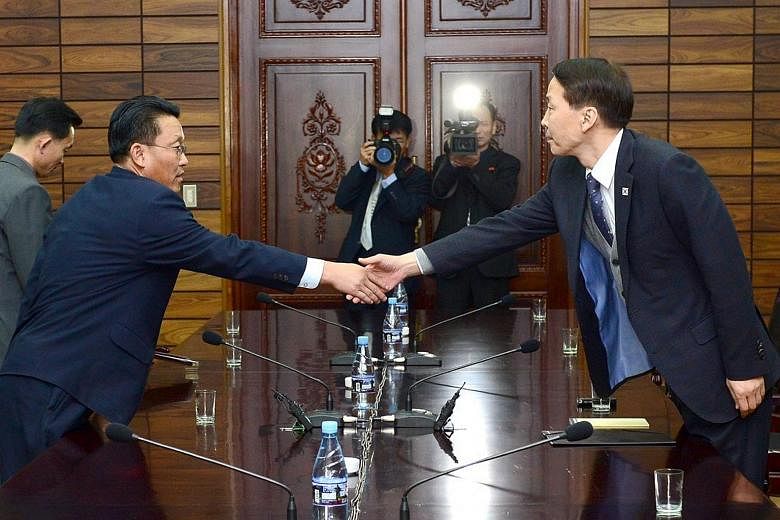SEOUL • North and South Korean officials sat down for rare talks aimed at setting up a sustainable high-level dialogue that has constantly eluded the two rivals.
The meeting at the border truce village of Panmunjom began yesterday afternoon, and marked the first inter-governmental interaction between Pyongyang and Seoul since August, when the two sides met to defuse a crisis that pushed them to the brink of an armed conflict.
That meeting ended with an agreement that included a commitment to resume high-level talks, although no precise timeline was given.
Although any dialogue between the two Koreas is generally welcomed as a step in the right direction, precedent offers little hope of a successful outcome.
In June 2013, both sides agreed to hold what would have been the first high-level dialogue in six years but Pyongyang cancelled a day before the scheduled meeting, after feeling insulted by Seoul's decision to send a vice-minister as its chief delegate.
The latest talks in Panmunjom will seek to avoid a similar situation by thrashing out an agenda, a venue and protocol, such as who should attend the full-fledged dialogue.
"We will do our best," said Mr Kim Ki Woong, the head of the South Korean Unification Ministry's special office for inter-Korean dialogue, before he left for Panmunjom.
After an initial round lasting about 90 minutes, both sides took a break to confer with their respective capitals, a Unification Ministry official said. "The mood was sincere, but there were differences," he said.
Likely topics for the eventual agenda include South Korea's desire for regular reunions for families separated by the 1950-1953 Korean War that cemented the division of the Korean peninsula.
North Korea, meanwhile, will want to discuss the resumption of visits by South Korean tour groups to its scenic Mount Kumgang resort.
The tours, a source of badly needed hard currency for cash-strapped North Korea, were suspended by South Korea in 2008 after a woman tourist was shot dead by a North Korean guard.
"The overall atmosphere for a successful conclusion of these talks is really not that favourable," said Mr Cheong Seong Chang, an analyst with the Sejong Institute think-tank in Seoul. "The two sides always find it hard to agree on the ranks of chief delegates to high-level talks, and there are a number of issues causing friction in cross-border ties at the moment," he added.
The talks come amid diplomatic shifts in North-east Asia that have left North Korea looking more isolated, with Seoul moving closer to Pyongyang's main diplomatic and economic ally China, and improving strained relations with Tokyo.
AGENCE FRANCE-PRESSE

